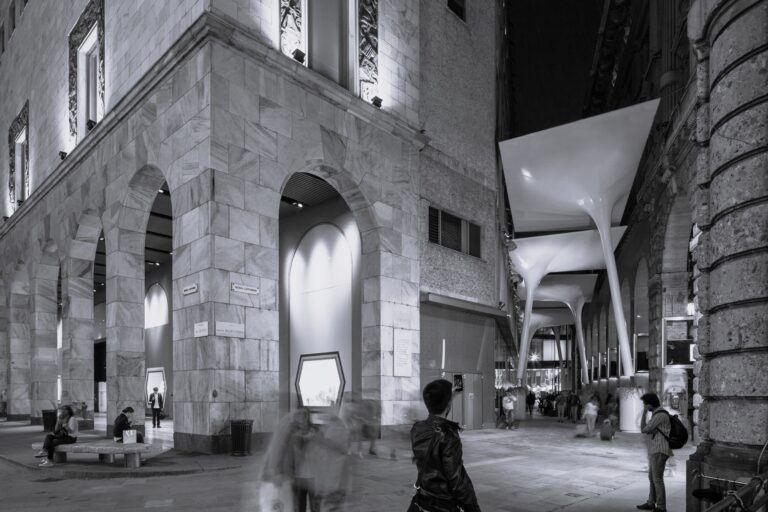dialogues: ALDO CIBIC.
founder of Cibic Workshop. honorary professor at the Tongji University. SHANGHAI.
more than ever, people seem to be looking for community and shared experiences. this makes the
role of third spaces increasingly important.
has something changed in the last decade in the way third spaces are planned and developed?
Third places are very important.
Modern commercial developments have ‘ignored’ the function of squares and markets—where people meet and communicate—by trying to transfer these functions to other spaces: shopping centers, multi-use structures, etc. These attempts have largely failed due to a lack of vision and errors in the approach to project development, but above all because development has ignored human relationships, reducing relationships to a give and take, an almost exclusive economic exchange.
Only now that e-commerce has eroded the physical trade market are traditional shopping and meeting places being re-evaluated. Unfortunately, after a long time, the human relationships in these places have been erased, and it is difficult to reconstruct forgotten dynamics.
If I think of Milan, for example, some urban redevelopments, such as the Prada and Pirelli re-qualification projects—both developed by the respective foundations—have had a positive urban impact. Others—the redevelopment of the 2015 expo area, for example—much less.
On one hand, I believe there are limits to capturing the spirit and needs of the time. On the other hand, there seem to be anomalies in the process, if not a true inversion of the logic upon which these spaces are designed.
Spaces today seem to be planned based on optimizing economic goals first. In many cases, it seems these complexes are created without considering the users in the design phase and, therefore, without a clear understanding of the function of the spaces. Then, when the buildings are ready, developers ‘fill’ them. It is evident that this reverse thinking has its limits and results in spaces often not functional or meaningful for their users.
what makes a successful third place?
Planning these spaces is far from simple. The development of ‘customer-facing’ projects is equal to the development of a cultural product. You can’t just think about the shareholders.
Developers need vision, time, budget and qualified stakeholders. Investors must also have a vision, and realistic expectations of the time required for this type of development, rather than aiming to obtain profits in a short time.
As you know, only operators who are aware of the need to create and work with groups with composite professional knowledge of the project and who are equipped with sufficient/realistic budgets are able to produce concepts solid enough to remain relevant to communities, and therefore be economically efficient.
are there differences between how public and private operators interpret desires and needs? does this affect the management of these types of projects?
This type of project requires vision and organization, combined with sincere curiosity and an ability to imagine new possibilities.
Private companies tend to have organization, but not always vision. The public sector—governments, agencies, institutions—tends to have the vision, but not always the organization.
I believe the public sector’s ability to manage urban redevelopment projects and third spaces depends on the historical context of individual states. The public sector in some countries, such as the UK, France, and China, can manage projects of this complexity. Italy, a little less so—not so much due to a lack of vision, but rather due to the tendency to operate based on closed work systems (the usual suspects) that are not very open to the new.

new, mixed-use developments are introducing cultural exhibitions and museums as key to the
successful development of offline communities.
how do different stakeholders view these spaces? developers are often attracted by the status a cultural institution could add to a project but are not able to shoulder the running costs.
Very often, cultural institutions have difficulties in financing their activities and, therefore, benefit from sponsorships from private individuals, who, in turn, require exposure and ‘cultural’ association.
Therefore, I think it is always necessary to maintain a balance between the objectives that safeguard the quality of the cultural product. Often, this does not happen, and the interests of the financial partners prevail.
Based on my experience, I think it is important to remember that the focus should remain on the user. Initiatives and events must offer visitors, as well as in-house employees, from doormen to guides, managers to cleaners—the true ‘ambassadors’ of the cultural operation, experiences of personal enrichment and opportunities for community debate.
Only when the visitor is placed at the center and engaged can the project have a positive impact, functioning through collaboration, rather than through ‘colonization’.
This could be achieved by avoiding excess conceptualization, ensuring every aspect of the exhibition or space produced maintains coherence, and, therefore, that any aspect of the narrative—what you see, what you read, and what you hear—is aligned. (By making sure) The cultural offerings could both capture the interest of the user and enrich the community.
Unfortunately, however, the objectives of these projects often have more to do with advertising and economic gain, failing to recognize the need for balance.
do you think this is related to the protests and discussions in the last few years regarding the ownership, use, and ‘invasion’ of public space by organizations and companies?
Often projects are loudly “announced” as community initiatives but have no real impact on the public.
This leads to protests from communities who feel excluded from the benefits of social operations—their perception is that there is no narrative beyond profits and there is no redistribution, just more exploitation of public goods.
In a certain sense, these initiatives end up being acts of violence towards users and display arrogance on the part of sponsors and financing partners. The public today is much more informed than in the past and, in the current climate, rightly protests.